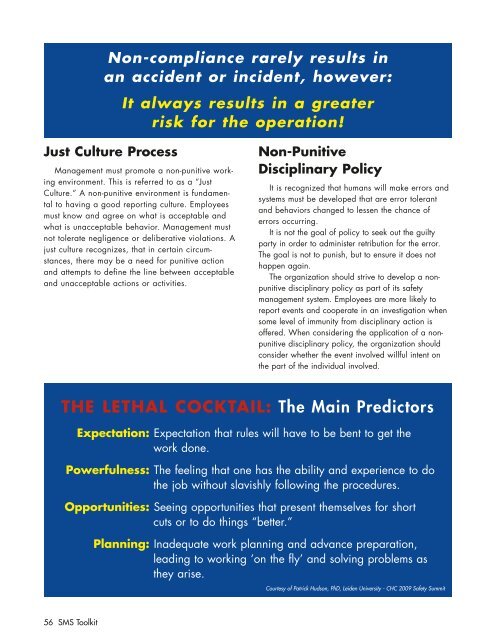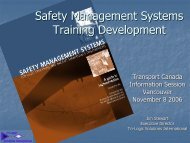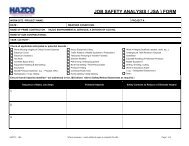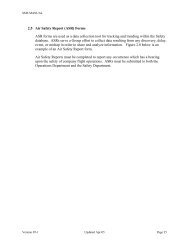International Helicopter Safety Team Safety Management System Toolkit
IHST - Safety Management Toolkit - Skybrary
IHST - Safety Management Toolkit - Skybrary
- No tags were found...
You also want an ePaper? Increase the reach of your titles
YUMPU automatically turns print PDFs into web optimized ePapers that Google loves.
Non-compliance rarely results in<br />
an accident or incident, however:<br />
It always results in a greater<br />
risk for the operation!<br />
Just Culture Process<br />
<strong>Management</strong> must promote a non-punitive working<br />
environment. This is referred to as a “Just<br />
Culture.” A non-punitive environment is fundamental<br />
to having a good reporting culture. Employees<br />
must know and agree on what is acceptable and<br />
what is unacceptable behavior. <strong>Management</strong> must<br />
not tolerate negligence or deliberative violations. A<br />
just culture recognizes, that in certain circumstances,<br />
there may be a need for punitive action<br />
and attempts to define the line between acceptable<br />
and unacceptable actions or activities.<br />
Non-Punitive<br />
Disciplinary Policy<br />
It is recognized that humans will make errors and<br />
systems must be developed that are error tolerant<br />
and behaviors changed to lessen the chance of<br />
errors occurring.<br />
It is not the goal of policy to seek out the guilty<br />
party in order to administer retribution for the error.<br />
The goal is not to punish, but to ensure it does not<br />
happen again.<br />
The organization should strive to develop a nonpunitive<br />
disciplinary policy as part of its safety<br />
management system. Employees are more likely to<br />
report events and cooperate in an investigation when<br />
some level of immunity from disciplinary action is<br />
offered. When considering the application of a nonpunitive<br />
disciplinary policy, the organization should<br />
consider whether the event involved willful intent on<br />
the part of the individual involved.<br />
THE LETHAL COCKTAIL: The Main Predictors<br />
Expectation: Expectation that rules will have to be bent to get the<br />
work done.<br />
Powerfulness: The feeling that one has the ability and experience to do<br />
the job without slavishly following the procedures.<br />
Opportunities: Seeing opportunities that present themselves for short<br />
cuts or to do things “better.”<br />
Planning: Inadequate work planning and advance preparation,<br />
leading to working ‘on the fly’ and solving problems as<br />
they arise.<br />
Courtesy of Patrick Hudson, PhD, Leiden University - CHC 2009 <strong>Safety</strong> Summit<br />
56 SMS <strong>Toolkit</strong>







